borrowings borrowings Christian lexicosemantical Armenian Armenian
Grazer Linguistische Studien 50 (Herbst 1998 ... - [romani] Projekt
Grazer Linguistische Studien 50 (Herbst 1998 ... - [romani] Projekt
- No tags were found...
Create successful ePaper yourself
Turn your PDF publications into a flip-book with our unique Google optimized e-Paper software.
Grazer Linguistische Studien 50 (Herbst 1998) 103<br />
Hristo Kyuchukov<br />
TURKISH AND ARMENIAN LOANWORDS IN BULGARIAN ROMANI<br />
1. INTRODUCTION<br />
The languages in a contact are characterized with phenomena as code-switching and <strong>borrowings</strong><br />
from language A to language B. <strong>Armenian</strong> and Turkish are two languages which<br />
came in a contact with Romani during the mid centuries, when the Roma people were in<br />
their way from India to Europe. According to Crystal (1992) vocabulary <strong>borrowings</strong> are<br />
usually called loanwords. Sankoff/Poplack/Vanniarajan (1991) estimate that the loanwords<br />
are impossible to distinguish from the native lexicon into which they are borrowed on the<br />
basis of phonology, morphology and syntax. The general principle is that content words are<br />
borrowed while function words are resistant to loan. There are studies which show <strong>borrowings</strong><br />
and loanwords in Romani from <strong>Armenian</strong> (Boretzky/Igla 1994; Boretzky 1995).<br />
However, up till now there is no any lexico-semantical classification made of the existing<br />
<strong>Armenian</strong> and Turkish loanwords in Romani.<br />
My observations here are on a dialect which exists in Bulgaria and it belongs to the<br />
group of Vlah dialects and it contains <strong>Armenian</strong> and Turkish loanwords. In some parts of<br />
Bulgaria this dialect is spoken by Muslim Roma and they are called Laho (Vlah Roma) (in<br />
North-East Bulgaria). In some other parts of Bulgaria the speakers of this dialect are <strong>Christian</strong><br />
Roma (for example in Southern parts of Bulgaria around the town of Stara Zagora)<br />
and they are called Dasikane Roma (<strong>Christian</strong> Roma). Kyuchukov (1994) reporting about<br />
the language mixing of Romani with Turkish among the Muslim Roma in Bulgaria also<br />
mentions this dialect calling it Laho dialect as the speakers of it call themselves.<br />
2. AIM OF THE STUDY<br />
My goal here is to classify the existing <strong>Armenian</strong> and Turkish loanwords into <strong>lexicosemantical</strong><br />
groups and to show two different types of loanwords: a) the first one from <strong>Armenian</strong><br />
(old forms of <strong>borrowings</strong>) and b) the new one from Turkish (new forms of <strong>borrowings</strong>).<br />
3. INFORMANTS AND DATA COLLECTION<br />
The data for this study was collected in Bulgaria among the speakers of Vlah dialect. This<br />
dialect is much more conservative than the existing non-Vlah dialects. The speakers have<br />
Muslim or <strong>Christian</strong> religion, however the both groups have the same loanwords from <strong>Armenian</strong><br />
and Turkish. They live in different circumstances and have different second lan-
104 H.Kyuchukov<br />
guages (L2) – the Muslims have Turkish as L2 and the <strong>Christian</strong>s have Bulgarian as L2. In<br />
their vocabulary one can find the same loanwords from both <strong>Armenian</strong> and Turkish (for<br />
example the word paramisi for 'fairy tale' in both groups is unknown and they use the word<br />
masali from Turkish masal 'fairy tale').<br />
The data was collected in the usual setting of the speakers – at home, speaking naturally,<br />
and they were asked to tell autobiographical story and a fairy tale in Romani. The conversations<br />
were recorded and transcribed. The informants are between 30 and 70 years old<br />
male and female and all together their total number is 5 – two male and three female (2<br />
female Muslim speakers from North- East Bulgaria and 2 male and 1 female <strong>Christian</strong> speakers<br />
from South Bulgaria).<br />
4. LEXICO-SEMANTICAL GROUP OF NOUNS<br />
4.1. Loanwords from <strong>Armenian</strong><br />
The <strong>Armenian</strong> loanwords in Romani are were adapted with very slight changes, usually as<br />
they exist in <strong>Armenian</strong>. It is known that Romani came in contact with <strong>Armenian</strong> before<br />
arriving to Greece and it is obvious that there are no Greek elements in this first type of<br />
loanwords. Here I will try to classify them in different lexico-semantical groups.<br />
4.1.1. Parts of human body<br />
þekat from Arm. þikar<br />
morþi from Arm. morth<br />
koþ from Arm koþ<br />
ogi from Arm ogi, hogi<br />
'forehead'<br />
'skin'<br />
'knee'<br />
'soul'<br />
4.1.2. Names of vegetables and fruits<br />
dudum from Arm. dudum<br />
'pumpkin'<br />
4.1.3. Names of foods<br />
bokoli from Arm. bokel<br />
xumer from Arm. x mor<br />
'small flat loaf'<br />
'dough'<br />
4.1.4. Names of animals<br />
grast from Arm. grast<br />
khuro from Arm. khurak<br />
rikono from Arm. koriwn<br />
'horse'<br />
'young horse'<br />
'puppy'
Turkish and <strong>Armenian</strong> Loanwords in Bulgarian Romani 105<br />
4.2. Loanwords from Turkish<br />
The loanwords from Turkish are much latter incorporated and they are formed differently.<br />
Usually the Turkish words are used without any phonological or morphological changes,<br />
but with Romani suffixes for masculine and feminine gender: -i, -es, -os. The loanwords<br />
with Turkish origin can be divided into the following groups.<br />
4.2.1. Names of plants, flowers, fruits and vegetables<br />
arpadzikos from Tur. arpacik<br />
asmas from Tur. asma<br />
bademi from Tur. badem<br />
baklas from Tur. bakla<br />
gjuli from Tur. gül<br />
zarzavati from Tur. zarzavat<br />
zjumbjul from Tur. zümbül<br />
limoni from Tur. limon<br />
pamukos from Tur. pamuk<br />
patladzani from Tur. patlacan<br />
spanakos from Tur. spanak<br />
'seed onions'<br />
'vine arbor'<br />
'almond'<br />
'broad beans'<br />
'rose'<br />
'greens, vegetables'<br />
'hyacinth'<br />
'lemon'<br />
'cotton'<br />
'eggplant, aborigine'<br />
'spinach'<br />
4.2.2. Names of animals<br />
gargas from Tur. garga<br />
melezi from Tur. mellez<br />
hergeles from Tur. hergele<br />
papagali from Tur. papagal<br />
'crow, rook'<br />
'half-blood'<br />
'herd of horses'<br />
'parrot'<br />
4.2.3. Words from the nature<br />
bostani from Tur. bostan<br />
boazi from Tur. boaz<br />
gjoli from Tur. göl<br />
derjav from Tur. dere<br />
kanaras from Tur. kanara<br />
meras from Tur. mera<br />
'melon field'<br />
'defile, gorge'<br />
'pool, puddle'<br />
'gully, gulch, ravine'<br />
'crag, cliff, rock'<br />
'common pasture'<br />
4.2.4. Names of minerals<br />
elmazi from Tur. elmaz<br />
kalajo, -i from Tur. kalay<br />
katrano, -i from Tur. katran<br />
sedefo, -i from Tur. sedef<br />
'diamond'<br />
'tin'<br />
'tar'<br />
'mother of pearl'
106 H.Kyuchukov<br />
4.2.5. Names of foods and drinks<br />
baklavas from Tur baklava<br />
bulguri from Tur. bulgur<br />
gjuveþi from Tur. güveç<br />
kajmas from Tur. kÕyma<br />
kajmaki from Tur. kaymak<br />
kaves, kajava from Tur. kahve<br />
kebapi from Tur. kebap<br />
kurabes from Tur. kurabe<br />
kjoftes from Tur. köfte<br />
lokumi from Tur. lokum<br />
mezes from Tur. meze<br />
musakas from Tur. musaka<br />
pastarmas from Tur. pastÕrma<br />
rakÕs from Tur. rakÕ<br />
sazdarmas from Tur. sÕzdÕrma<br />
sarmas from Tur. sarma<br />
turšus from Tur. turúu<br />
halvas from Tur. halva<br />
þorbas from Tur. çorba<br />
šerbeti from Tur. úerbet<br />
jufkas from Tur. üfka<br />
'baklava'<br />
'grouts, croup, grits'<br />
'earthenware dish, pan'<br />
'minced mead'<br />
'cream'<br />
'coffee'<br />
'grilled meal'<br />
'cookie, biscuit'<br />
'meat ball'<br />
'Turkish delight'<br />
'appetizer'<br />
'meat and vegetable hash'<br />
'dried, jerked, cured meat'<br />
'plump, grape brandy'<br />
'corned beef, pork'<br />
'stuffed cabbage/ vine leaves'<br />
'pickled vegetables, pickles'<br />
'khalva'<br />
'soup'<br />
'syrup, sherbet'<br />
'noodles'<br />
4.2.6. Names of plays and musical instruments<br />
dajres from Tur. dayre<br />
zurnas from Tur. zurna<br />
kjoþeki from Tur. köçek<br />
maanes, maanedes from Tur. maane<br />
sazi from Tur. saz<br />
tarbukas from Tur. tarbuka<br />
'tambourine'<br />
'kind of clarinet'<br />
'belly dance'<br />
'folk song'<br />
'kind of guitar'<br />
'pander, mandolin, lute'<br />
5. LEXICO-SEMANTICAL GROUP OF VERBS<br />
This particular dialect contents also a lots of verbs, which roots are from Turkish nouns. The<br />
first group are the verbs, which are formed with verb formation elements: -disajlo, -tisajlo.<br />
a) verbs, formed with suffix -disajlo<br />
asladisajlo from the Turkish verb aslamak 'graft, bud'<br />
kondisajlo from konmak 'alight, perch'<br />
kavardisajlo from kavarmak 'fry, roast'
Turkish and <strong>Armenian</strong> Loanwords in Bulgarian Romani 107<br />
ujdisajlo from uymak 'agree'<br />
kalajdisajlo from kalaylamak 'tin'<br />
b) verbs, formatted with suffix -tisajlo<br />
artisajlo from artmak 'stay'<br />
alastisajlo from alasmak 'get use to'<br />
bastisajlo from basmak 'step'<br />
þaktisajlo from çakmak 'remember'<br />
sinaštisajlo from sinaúmak 'get use to'<br />
Another group of verbs with Turkish origin are formed from Turkish words (often nouns)<br />
with the copula etmek 'to do' or olmak 'to become'. Often these verbs are loan translations<br />
from Turkish.<br />
c) verbs from Turkish nouns plus verb etmek 'make, do'<br />
from inat etmek inatlici kerav 'be obstinate'<br />
from kepaze etmek kepazes kerav 'make a show of somebody else'<br />
from maytap etmek majtapi kerav 'mock'<br />
from maskara etmek maskaras kerav 'defile, sully'<br />
from pazarlik etmek pazarlici kerav 'bargain'<br />
from trampa etmek trampas kerav 'exchange'<br />
d) verbs from Turkish nouns plus verb olmak 'become, stand'<br />
from maskara olmak maskaras kerdiljom 'I made a show of myself '<br />
from rezil olmak rezili kerdiljom 'I made a show of myself '<br />
from pisman olmak pishmani kerdiljom 'I am sorry'<br />
From the <strong>Armenian</strong> nouns also is possible to be formed verbs with the copula dav.<br />
for example from shol shol dav 'whistle'<br />
However from <strong>Armenian</strong> nouns are formed adjectives with the suffix -alo, which also can<br />
be grouped.<br />
for example zoralo from Arm. zor 'strong'<br />
pixalo from Arm. pix 'rheumy-eyed'<br />
pakivalo from Arm. paþhiv 'believer'<br />
6. CONCLUSIONS<br />
The classification presented here gives floor for discussions about the typology of codeswitching<br />
– are these words nonce <strong>borrowings</strong> or established loanwords. It seems that the<br />
<strong>Armenian</strong> words are established loanwords, because there are evidences from other dialects
108 H.Kyuchukov<br />
where these words are used as well. The question which arises is about the Turkish words.<br />
It is obvious that in the vocabulary of the speakers of this dialect there are words from different<br />
areas which are missing. Than the question is why the speakers do not borrow those<br />
words from Bulgarian, which is the language of the majority. Why although the differences<br />
in their L2 the speakers do use the same Turkish words. It seems to me that these words are<br />
also established loanwords, although they are acquired later than the <strong>Armenian</strong> ones. It is<br />
known that till some 50 years ago, different groups of Roma were speakers of Turkish because<br />
of historical reasons. It is quite possible that the Turkish words in the vocabulary of<br />
the speakers of this dialect are also established loanwords since 50-60 years. This could be<br />
the reason that they do not use Bulgarian and prefer Turkish ones. Perhaps these are the<br />
words which are acquired first at home. Than it is natural these words to be accepted as<br />
Romani ones.<br />
REFERENCES:<br />
Boretzky, N. 1995 Armenisches im Zigeunerischen (Romani und Lomavren), Indogermanische<br />
Forschungen 100: 137–155.<br />
Boretzky, N./Igla, B. 1994 Wörterbuch Romani-Deutsch-English, Wiesbaden.<br />
Crystal, D. 1992 An Encyclopedic Dictionary of Language and Languages, London.<br />
Kyuchukov, H. 1994 Language Mixing among Muslim Roms in Bulgaria. Paper presented at<br />
the Second International Conference on Romani Linguistics, Amsterdam.<br />
Sankoff, D./Poplack, S./Vanniarajan, S.<br />
1991 The Empirical Study of Code-switching, in: Papers for the Symposium on<br />
Code-Switching in Bilingual Studies: Theory, Significance and Perspectives.<br />
Vol 1, Strasbourg: 181–206.<br />
Hristo Kyuchukov<br />
Open Society Institute<br />
Budapest


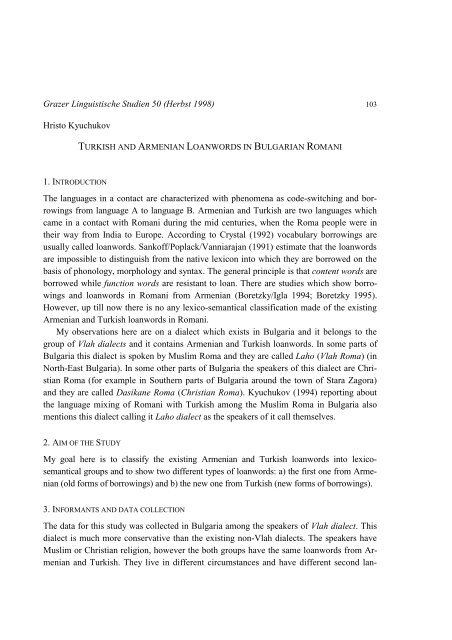
![Download PDF - [romani] Projekt](https://img.yumpu.com/54255972/1/184x260/download-pdf-romani-projekt.jpg?quality=85)
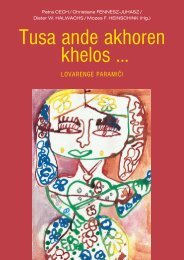
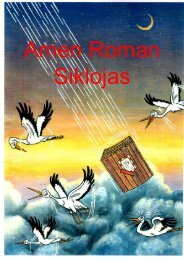
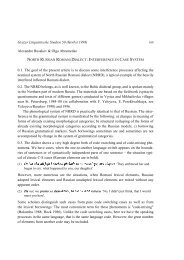
![Download PDF - [romani] Projekt](https://img.yumpu.com/54255951/1/184x260/download-pdf-romani-projekt.jpg?quality=85)
![Grazer Linguistische Studien 51 (Frühjahr 1999 ... - [romani] Projekt](https://img.yumpu.com/54255949/1/184x260/grazer-linguistische-studien-51-fra-1-4-hjahr-1999-romani-projekt.jpg?quality=85)
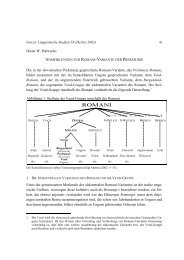
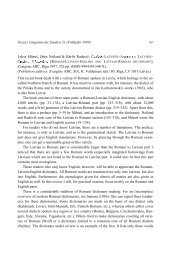
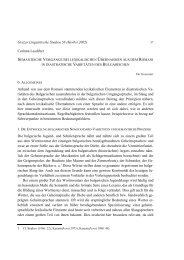
![Download Lehrbuchkommentar - [romani] Projekt](https://img.yumpu.com/16351903/1/184x260/download-lehrbuchkommentar-romani-projekt.jpg?quality=85)
![Download PDF - [romani] Projekt](https://img.yumpu.com/10027974/1/184x260/download-pdf-romani-projekt.jpg?quality=85)